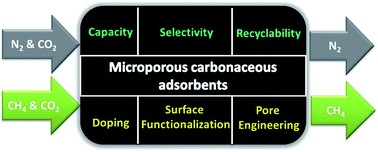

 Selective adsorption of CO2 has important implications for many energy and environment-related processes, which require the separation of CO2 from other gases (e.g. N2 and CH4) with high uptakes and selectivity. The development of high-performance adsorbents is one of the most promising solutions to the success of these processes. The present review is focused on the state-of-the-art of carbon-based (carbonaceous) adsorbents, covering microporous inorganic carbons and microporous organic polymers, with emphasis on the correlation between their textural and compositional properties and their CO2 adsorption/separation performance. Special attention is given to the most recently developed materials that were not covered in previous reviews. We summarize various effective strategies (N-doping, surface functionalization, extra-framework ions, molecular design, and pore size engineering) for enhancing the CO2 adsorption capacity and selectivity of carbonaceous adsorbents. Our discussion focuses on CO2/N2 separation and CO2/CH4 separation, while including an introduction to the methods and criteria used for evaluating the performance of the adsorbents. Critical issues and challenges regarding the development of high-performance adsorbents as well as some overlooked facts and misconceptions are also discussed, with the aim of providing important insights into the design of novel carbonaceous porous materials for various selective adsorption based applications.
Selective adsorption of CO2 has important implications for many energy and environment-related processes, which require the separation of CO2 from other gases (e.g. N2 and CH4) with high uptakes and selectivity. The development of high-performance adsorbents is one of the most promising solutions to the success of these processes. The present review is focused on the state-of-the-art of carbon-based (carbonaceous) adsorbents, covering microporous inorganic carbons and microporous organic polymers, with emphasis on the correlation between their textural and compositional properties and their CO2 adsorption/separation performance. Special attention is given to the most recently developed materials that were not covered in previous reviews. We summarize various effective strategies (N-doping, surface functionalization, extra-framework ions, molecular design, and pore size engineering) for enhancing the CO2 adsorption capacity and selectivity of carbonaceous adsorbents. Our discussion focuses on CO2/N2 separation and CO2/CH4 separation, while including an introduction to the methods and criteria used for evaluating the performance of the adsorbents. Critical issues and challenges regarding the development of high-performance adsorbents as well as some overlooked facts and misconceptions are also discussed, with the aim of providing important insights into the design of novel carbonaceous porous materials for various selective adsorption based applications.